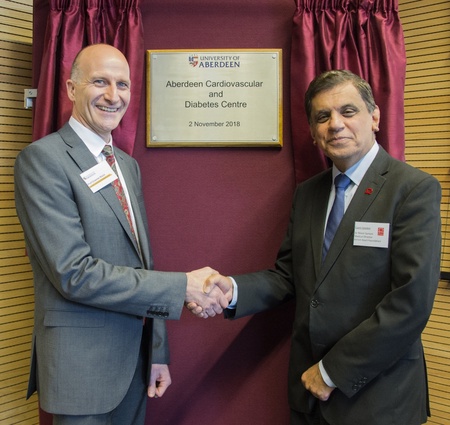The University of Aberdeen welcomed around 70 guests to the launch of the Aberdeen Cardiovascular and Diabetes Centre (ACDC) today (Friday, November 2).
Experts from the University’s Medical School and the Rowett Institute are bringing together their expertise to enhance cardiovascular and diabetic patient care through research and education.
The launch took place at the Rowett Institute and attendees heard from senior academics about their research, which encompass a variety of themes, from how to reduce risk in diabetes and cardiovascular diseases, to develop new treatments, to improving diagnosis and to train future researchers.
Sir Nilesh Samani, Medical Director of the British Heart Foundation, officially launched the centre, unveiling a plaque to mark the occasion.
Professor Graeme Nixon, who is co-director of the ACDC alongside Professor Mirela Delibegovic commented: “We are fortunate here in Aberdeen that we have so many internationally renowned researchers working in the areas of cardiovascular disease and diabetes, and are therefore well placed to bring all this expertise into one collective centre.
“It is impossible to look at these issues in isolation as many diabetics patients also suffer from cardiovascular disease. Our centre will offer the perfect opportunity for the sharing of knowledge and collaboration between our researchers from a variety of backgrounds, from those studying heart disease, to those focussing on obesity and its links with diabetes.
“The centre is also dedicated to education, and a key part of the ACDC will be to train the next generation of researchers, including research students, clinical fellows and early career researchers, to focus more closely on patient outcomes.
“In 1923, Professor John J R McLeod from the University was awarded the Nobel Prize Medicine for discovering Insulin as a treatment for diabetes, and it is exciting that academics from this institution are still leading the way in trying to enhance patient care in these areas.”


